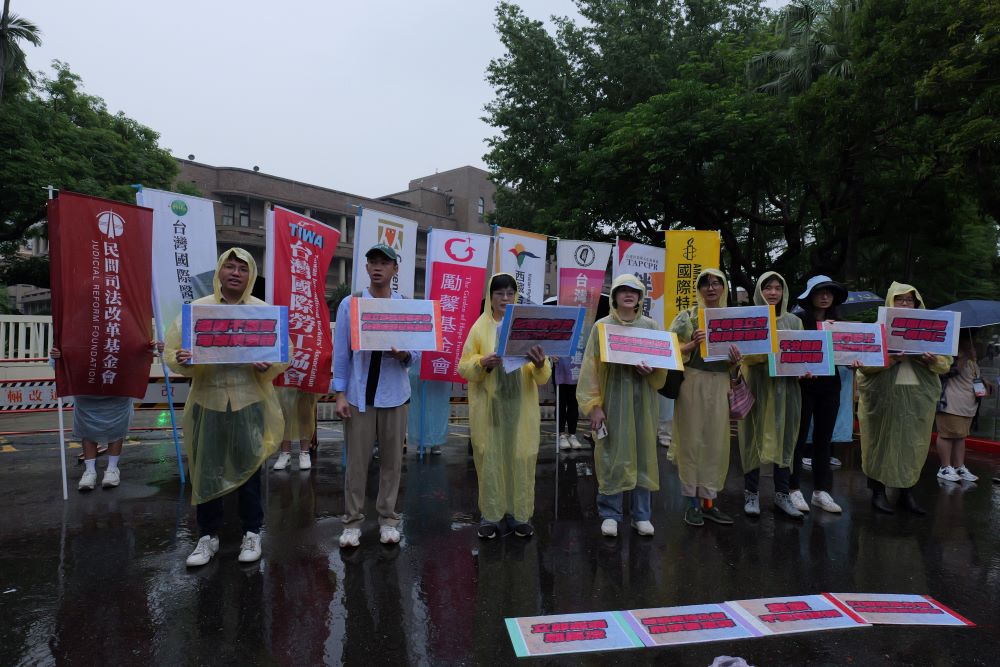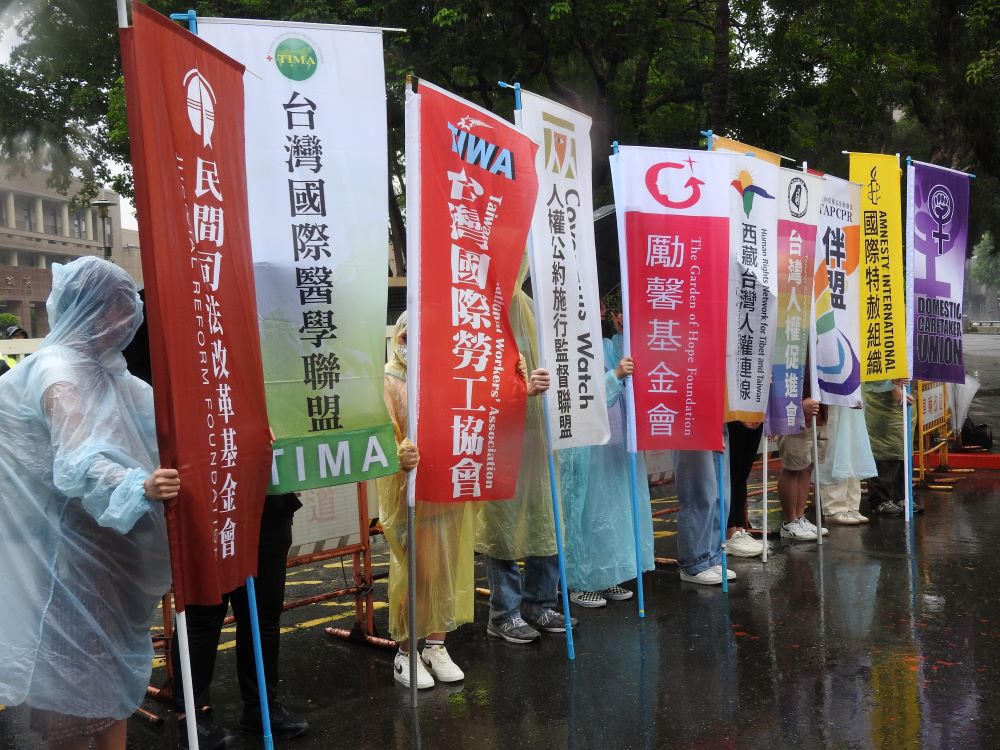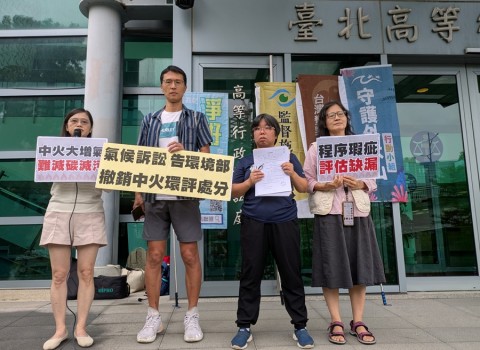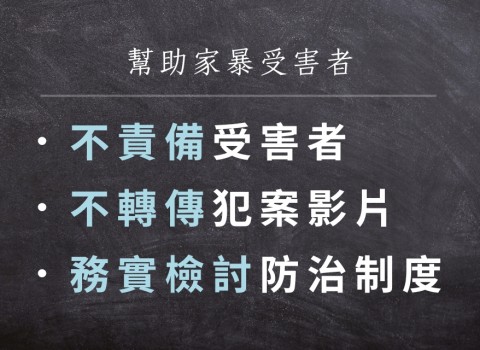圖片來源:人權公約施行監督聯盟
文/人權公約施行監督聯盟、TIWA台灣國際勞工協會、人權公約施行監督聯盟、台北律師公會人權委員會、台灣人權促進會、台灣伴侶權益推動聯盟、台灣原住民族青年公共參與協會、台灣原住民族政策協會、台灣國際醫學聯盟、宜蘭縣崗給原住民永續發展協會、社團法人台灣萬人社福協會、社團法人西藏台灣人權連線、社團法人壹零玖伍移民工文化協會、原住民族青年陣線、桃園市家庭看護工職業工會、財團法人民間司法改革基金會、國際特赦組織台灣分會、國際臺灣克里奧爾語言促進會籌備會、臺灣文化安全心理健康促進會籌備會、勵馨社會福利事業基金會、聽你說法律公共衛生諮詢平台
◆時間:2024 年4月26日 (五) 11:45 (隨政府ICERD結論性意見發表會動態調整)
◆地點:行政院 (中山北路與忠孝西路口)
◆直播:https://fb.me/e/5ci2CSZD2

圖片來源:民間司法改革基金會
歷經超過半世紀,1971年已對我國產生法律拘束力的《消除一切形式種族歧視公約》(ICERD),總算召開首次國家告報國際審查會,並隨今 (4/26) 日審查委員會發表結論性意見正式落幕。ICERD在我國還是聯合國會員國時即完成條約締結程序,並對我國產生法律拘束力;但正如同審查委員會在審查會上所言,ICERD並不普遍直接適用在台灣,而羅秉成政委也承認直到2020年ICERD才被重視。ICERD未受台灣政府重視,自2013年首次兩公約審查即被審查委員會點名,民間團體也持續與政府溝通協商落實辦法。
如今國際審查會議的結束,才正是監督與追蹤政府落實人權的開始!十來個原住民族團體、移工工會、人權倡議等本土和國際民間團體集結召開審查會後民間記者會,呼籲政府切莫持續忽視種族歧視的影響與威脅,正視國際審查委員會的建設性建議,積極落實公約精神、促進人權保障!
人權公約施行監督聯盟執行長黃怡碧解構結論性意見,指出IRC據證歷歷期許能說服政府停機半世紀開始轉動的齒輪,在未來四年有具體改善。法制層面,立平等法再次被提出,且建議政府進行分眾討論且立法應廣泛、涵蓋多數歧視事由;仇恨言論則透過刑法治罪。國際法除屢被提及ILO C188與C189,C169針對原住民族、部落居民給予平等就業權利也被提出。移工部分,IRC建議政府正當化失聯移工居留權、給予黑戶寶寶國籍身分,並確立移工入台一定期間後完整轉換雇主的權利。NHRC部分,專家建議他們優先選擇二至三議題展開國家詢查。最後,黃執行長重申嚴正建議與要求:人權及轉型正義處與NHRC應合作邀請國際審查會員組成國際人權專家智庫,以及時就教;針對重大人權爭議,應仿效聯合國邀請相應專業的專家來台進行調查;最後則提醒政府應在日常行政工作就表現對人權的承諾。
原住民族青年陣線成員Akoy簡年佑表示在這次的ICERD公約審查,委員特別提及,原住民族的議題和各人權公約審查有高度重疊,並且似乎自2013年至今並無顯著進展。而當前原住民族面臨的各種歷史至今的不平等,正是由制度建構的種族歧視。本次參與審查的原民NGO工作小組一再強調,我們必須建立原住民族與國家對話的開放平台,而不是一個又一個閉門遴選參與者的各式工作小組與委員會。唯有公開透明的誠懇對話,才能打破僵局、讓公部門與民間力量,一起推進原住民族的權利進展。
桃園市家庭看護工職業工會理事長Jasmin Ruas戳穿政府謊言,表示台灣政府從未鼓勵移工加入工會,薪資提升至2萬元更非強制要求,仍有家事移工月薪只有1萬7;此外勞動條件更是低落,工時24/7、缺勞保、無隱私且與外界隔絕等皆讓他們淪為脆弱群體。私人仲介更罄竹難書,不同產業移工皆無法自由轉換工作、受仲介高度控制、層層剝削甚至扣押證件;而台灣政府卻對此猶如一無所知,更將政府義務過度給仲介,如移工前往政府機關申辦業務,劈頭就被問仲介在哪?彷彿政府沒有義務實現在台移工權利。警察執法更坐實台灣存在嚴重種族定性問題。她重申移工當然想合法,但沒人願意成為使人為奴政策下的工作者。
勵馨社會福利事業基金會移住者服務中心督導曾以恩整合一起提交平行資料的4個民間團體意見重申跨國移動工作充滿挑戰,疾呼政府應盡速召開家事移工權益保障法治化政策會議,從人權實踐、同工同酬與社會安全等面向,正視家事移工在種族、性別、勞動環境的多重脆弱性與不平等,並建立法律保障機制。此外,現行反歧視規範散見於不同法律造成申訴阻礙,政府應建立歧視申訴獨立機制,受理申訴、展開調查並有效追蹤改善。曾督導也提到政府提供各式公共服務應具備充足的多元文化敏感度,積極佈建多語資源、彌平資訊落差,讓跨境工作者也能與國人享有相同品質的衛生、司法、社會文化等公共資源。
台灣人權促進會難民議題專員賴彥蓉提到台權會在本 (4) 月初接到兩位已向移民署提出庇護申請且正在審查者,被警政單位抓至收容所拘禁,其一拘禁更長達10天,完全打臉移民署說不會拘留庇護尋求者。此外移民署也不若所言提供庇護尋求者延長合法停留所需協助,目前超過半數庇護專案個案待審超過六個月也未取得暫時性合法身分,甚至被抓捕;生活支持更常是仰賴社群接濟度日。機場遣返層面,移民署稱一旦有尋求庇護需求將展開調查,但事實是因機場未設立移民署庇護窗口,當事人即使提出遣返存在迫害風險也無從上報開啟調查程序,致使許多人未經調查即被遣返至恐危害當事人生命安全的國家。
台灣伴侶權益推動聯盟法務主任謝孟釗律師則關注我國同性婚姻仍存在不平等條款,直指現行同婚制度針對中國籍伴侶行差別待遇、不允許台灣中國同性伴侶締結婚約,這甚至可能造成對中國同志的歧視,因台灣並未禁止台灣中國異性戀伴侶結婚;政府應正視台灣中國同性伴侶締結婚姻的權利。此之,在台擁有合法居留權的外國同性伴侶若想在台結婚,則必須先確保母國法律承認同性婚姻否則台灣政府將「歉難辦理」。目前全球承認同性婚姻國家仍為少數、在亞洲更是稀缺,提醒政府台灣領土不應存在同性婚姻差別待遇,凡有合法居留權者皆有權在台合法締結婚姻。
國際特赦組織台灣分會秘書長邱伊翎:台灣沒有難民法,侵害了難民與尋求庇護者的基本權利,更違反了國際人權標準;在無符合國際標準的難民庇護機制下,更難以維護國家安全。另外,在台的移工除了處在較國人惡劣的勞動環境之外,《出入國移民法》更剝奪他們以和平抗議的方式爭取權利、改善勞動條件。而在管制歧視性言論與鼓吹仇恨上,政府與大型社群平台必須按照公民與政治權利公約與拉巴特行動計畫等國際人權標準;此外,面對交織歧視與多重歧視,政府應推動具獨立監督與救濟機制的綜合性平等/反歧視法。最後,呼籲政府必須去除國籍與性傾向歧視並允許台灣與中國籍同性伴侶結婚登記。
財團法人民間司法改革基金會法案研究員林承慶針砭司法院在審查會上說「目前司法程序面對原住民族沒有發生無法提供通譯的情況」,實為中文本位思考的傲慢展現。原住民族語言已是國家語言,政府回應司法院提供11種、法務部提供7種語言,卻未言明計算方式;且據了解,官方通譯不足會轉向族語教師申請支援,然司法程序有其特定表述與程序邏輯,這種「支援」能否應付司法程序不得而知。外國人層面,無論移工或新住民同樣面臨司法通譯不足,不僅不同語言通譯人才數量有嚴重落差,更存在城鄉差距,而通譯人才能否有效「辨認爭點」更充滿挑戰。林研究員也提醒移民署與關務系統通譯也同等重要!
政府代表在審查會提到「人權常常處於抗多數決困境」,然而這絕非政府拿來推諉履行人權義務的藉口。作為非聯合國會員國,台灣政府自主將國際人權標準內國法化,向國際宣示實踐人權的決心,人權立國不應只是口號,而是真實可見、可衡量追蹤的法規政策與實踐!
▋統籌單位:人權公約施行監督聯盟
▋共同主辦:TIWA台灣國際勞工協會、人權公約施行監督聯盟、台北律師公會人權委員會、台灣人權促進會、台灣伴侶權益推動聯盟、台灣原住民族青年公共參與協會、台灣原住民族政策協會、台灣國際醫學聯盟、宜蘭縣崗給原住民永續發展協會、社團法人台灣萬人社福協會、社團法人西藏台灣人權連線、社團法人壹零玖伍移民工文化協會、原住民族青年陣線、桃園市家庭看護工職業工會、財團法人民間司法改革基金會、國際特赦組織台灣分會、國際臺灣克里奧爾語言促進會籌備會、臺灣文化安全心理健康促進會籌備會、勵馨社會福利事業基金會、聽你說法律公共衛生諮詢平台
▋主持人:
江孟真|人權公約施行監督聯盟辦公室主任
▋發言代表:
Akoy 簡年佑|原住民族青年陣線成員
Jasmin Ruas|桃園市家庭看護工職業工會理事長
曾以恩|勵馨社會福利事業基金會移住者服務中心督導
賴彥蓉|台灣人權促進會難民議題專員
謝孟釗|台灣伴侶權益推動聯盟法務主任、律師
邱伊翎|國際特赦組織台灣分會秘書長
林承慶|財團法人民間司法改革基金會法案研究員
黃怡碧|人權公約施行監督聯盟執行長
▋本次審查平行文件共同提交團體 (按筆順):
LIMA 台灣原住民青年團、TIWA台灣國際勞工協會、人權公約施行監督聯盟、台灣人權促進會、台灣原住民族社會工作學會、台灣原住民族政策協會、台灣國際醫學聯盟、台灣廢除死刑推動聯盟、宜蘭縣崗給原住民永續發展協會、宜蘭縣漁工職業工會、社團法人台灣民間真相與和解促進會、社團法人西藏台灣人權連線、社團法人臺灣文化安全心理健康促進會籌備會、社團法人臺灣原住民族長期照顧服務權益促進會、社團法人環境法律人協會、原住民族青年陣線、財團法人天主教耶穌會台北新事社會服務中心、財團法人天主教會新竹教區越南移工移民辦公室、財團法人民間司法改革基金會、國際臺灣克里奧爾語言促進會籌備會
Press Release
2024/04/26
Civil Society Holds a Press Briefing on the Concluding Observations of the Taiwan’s Initial Report under the ICERD
◆Time: 26 April 2024, 11:45
◆Venue: Main Entrance of Taiwan’s Executive Yuan (Intersection of Zhongxiao E. Rd. and Zhongshan N. Rd.)
◆Live Stream: https://fb.me/e/5ci2CSZD2
After over half a century, The Internaitonal Convention on the Elimination of All Forms of Racial Discrimination (ICERD), which has been legally binding on Taiwan since 1971, finally convened its first International Review Meeting of the Initial National Report. And this has come to an end with the release of the Concluding Observations of the International Review Committee today on 26 April. Our Government had completed the process of signing ICERD when our country was still a member of the United Nations (UN), hence it has become a legally binding treaty for Taiwan. Notwithstanding, as the Review Committee stated during the conference, ICERD does not become generally and directly applicable to Taiwan, and the Luo Ping-cheng (羅秉成), Minister Without Portfolio, also admitted that it was not until 2020 was ICERD taken seriously by the Government. Back in 2013, when Taiwan underwent the International Review of The Initial National Report of the Two Covenants, the then Review Committee raised that ICERD had not been taken seriously by the Taiwan Government, and ever since, the civil society organisations (CSOs) have been communicating with the Government to figure out how to implement it.
The conclusion of the International Review Meeting, however, marks the beginning for CSOs to monitor and track the progress of the Government’s implementation of human rights. More than a dozen local and international CSOs, including indigenous peoples’ rights organisations, labour unions of migrant workers, and human rights advocates, gathered for a press briefing on the Concluding Observations to call on the Government to stop turning a blind eye to the human rights impact and threats of racial discrimination, but rather to address the constructive recommendations of the International Review Committee, therefore, proactively implement them in accordance with the spirit of ICERD and promote human rights protection!
Akoy, member of Indigenous Youth Front emphasized how IRC members highlighted the high degree of overlap between indigenous issues and previous convention reviews, and the lack of significant progress since 2013. The historical inequalities faced by indigenous peoples today are institutionally constructed racial discrimination in itself. The working group of indigenous NGOs participating in this review has repeatedly emphasized the need for an open platform for dialogue between indigenous peoples and the state, rather than a series of working groups and committees that select participants behind closed doors. Open, transparent and sincere dialogue is what breaks the deadlock, and allows the public sector and civil society to work together to advance the rights of indigenous peoples.
Jasmin Ruas, Chairperson, Domestic Caretakers Union Taoyuan rushed from the official press conference of the Concluding Observations and shouted out the voices of migrant workers in English, exposing the government’s lies one by one. He mentioned that the Taiwan Government has never encouraged migrant workers to join trade unions, not to mention that the wage increase is even more of a mirage. The salary of 20,000 NTD, which is lower than the basic wage in Taiwan, is not even mandatory, and in practice, there are still domestic migrant workers who only receive 17,000 NTD a month. In addition to low wages, the labour conditions of domestic migrant workers are even worse. With them working 24/7, with no labour insurance, privacy and being in isolation from the outside world, all make domestic migrant workers a vulnerable population. Private agencies are even worse, as migrant workers in different industries are unable to change jobs freely, and are highly controlled by the private agencies, who often exploit them and even seize their documents. The Taiwanese government seems to be ignorant of this issue, and even overloads the agencies with government obligations, for example, when migrant workers go to a government agency for some paperwork, the public servants will ask them, ‘Where is your agency?’, as if the Government has no obligation to protect and realise migrants’ rights in Taiwan. The police’s enforcement of the law also confirms that there is a serious problem of racial profiling in Taiwan, and Jasmin reiterates that all migrant workers certainly wish to hold legal work permits as suggested by the Review Committee, but no one would like to become a worker under in slavery.
Yi-En Tzeng, Supervisor, GOH-Migrants, The Garden of Hope Foundation compiled the views of 4 NGOs who submit a joint parallel report and reiterated that it is indeed challenging to work in other countries. Tzeng urged the Government to expeditiously convene a meeting on the policy that protects the rights and interests of migrant domestic workers through law amendment. It should focus on how to address the multiple vulnerabilities and inequalities of migrant domestic workers in terms of race, gender, and labour environment from different perspectives, such as human rights and good practices, equal pay for work of equal value, and social security, as well as to set up a mechanism to protect them in the eyes of the law. In addition, since discrimination takes various forms, and the existing regulations are scattered in different laws, thus hindering complaints, the Government should set up an independent mechanism for receiving discrimination complaints. It should also carry out investigations, and effectively track the implementation of improvements. Tzeng also mentioned that the Government should face the fact that Taiwan has long been a multi-ethnic society, and that it should be sufficiently sensitive to multiculturalism in the provision of public services. It should actively build up multilingual resources and bridge the information gap, so that migrant workers can be equal with those who speak Chinese in the enjoyment of public services, such as health care, justice, and social and cultural resources at the same quality.
Yen Rong Lai, Refugee Rights Campaigner of Taiwan Association for Human Rights (TAHR), is particularly concerned about the National Immigration Agency’s (NIA) inaccurate response to the refugee issue at the Review Meeting. Lai mentioned that in early April this year, TAHR received reports that two asylum seekers who had applied to NIA and whose applications were under review were arrested and detained in a detention centre by the police. One of them was imprisoned for as long as 10 days, which disproves NIA’s claim that it does not detain asylum seekers. In addition, the NIA does not provide asylum seekers with the assistance they need to extend their legal stay, and more than half of the cases currently in the asylum programme have been pending for more than six months without obtaining temporary legal residence permit, which has even led to arrests. Moreover, they often have to rely on the local community’s support to get by. When it comes to the repatriation at the airport, NIA said that whenever an asylum request was made, an investigation will be initiated to assist the case. In reality, however, the absence of NIA asylum desk at the airport had rendered it impossible for the person concerned to apply for assessment even if one claims that there is a risk of persecution if they are repatriated, which results in many cases being repatriated to a country where their lives may be in danger without having their claim assessed.
Meng-Chao Hsieh, Legal Affairs Director and Lawyer of Taiwan Alliance to Promote Civil Partnership Rights, urges the State to recognize the right of Taiwanese-Chinese same-sex couples to enter marriage. Hsieh is concerned about the unequal terms of same-sex marriage in Taiwan, pointing out that the current same-sex marriage system treats Chinese individuals differently and does not allow Taiwanese-Chinese same-sex couples to register their marriage, which may be discriminatory against Chinese LGBTQ+ persons, as Taiwan does not prohibit Taiwanese-Chinese heterosexual couples from getting married. In addition, foreign same-sex couples with legal residency in Taiwan who wish to marry in Taiwan must first ensure that their home country’s laws recognize same-sex marriages; otherwise, the Taiwanese government will be “unable to comply”. There are still only a handful of countries in the world that recognize same-sex marriages with a further diminished presence in Asia. The State shall be reminded that there should be no differential treatment of same-sex marriages in Taiwanese jurisdiction, and the right to form marriage contracts shall be granted for anyone with legal residency in Taiwan.
Eeling Chiu|National Director, Amnesty International Taiwan, stressed that in the absence of a refugee law, Taiwan infringes on the basic rights of refugees and asylum seekers, and violates international human rights standards; without a refugee asylum mechanism that meets international standards, it is even more difficult to safeguard national security. In addition, migrant workers in Taiwan are not only subjected to worse labour conditions than Taiwanese nationals, but the Immigration Act also deprives them of the right to fight for their rights and improve their labour conditions through peaceful protests. In regulating discriminatory speech and advocacy of hatred, the Government and large social media platforms must comply with international human rights standards such as the International Covenant on Civil and Political Rights and the Rabat Plan of Action. Moreover, in the face of intersectional and multi-discrimination, the government should promote a comprehensive equality/anti-discrimination law with an independent monitoring and redress mechanism. Finally, the government is called upon to eliminate discrimination on the basis of nationality and sexual orientation and to allow the registration of marriages between Taiwanese and Chinese same-sex couples.
Cheng-Ching Lin, Legal Assistant Researcher of Judicial Reform Foundation, criticized the Judicial Yuan’s statement in the review meeting that “at present, there are no cases in which the judicial process is unable to provide translation for the indigenous peoples”. This demonstrated the arrogance of Mandarin-centric thinking. The State claimed its provision of 11 languages in response to the Judicial Yuan’s request and 7 languages in response to the Ministry of Justice’s request, without specifying the method of calculation. It is understood that if the official translation is insufficient, the government will turn to the teachers of the language to apply for support, however, the judicial process has its own specific expression and procedural logic, so it remains unknown if this kind of ‘support’ can be used in the judicial process. For foreigners, both migrant workers and new immigrants face the challenge of inadequate judicial interpretation. Not only is there a serious discrepancy in the number of interpreters for different languages, but there is also discrepancy between service density of urban and rural areas; furthermore, the ability of interpreters to effectively recognize the points of contention can be further scrutinized. Mr. Lin also reminded the interpretation services for NIA and the Customs are equally important.
Yibee Huang, Chief Executive Officer of Covenants Watch, reaffirmed that the State shall legislate implementing acts to establish the criteria for the implementation of human rights treaties in Taiwan. The State shall also simultaneously legislate a comprehensive equality/anti-discrimination law, while establishing a competent governing body. Ms. Huang emphasized that the National Human Rights Commission and the Executive Yuan shall collaborate in the investigation on the governing authority, thoroughly illustrate the functional structures, ensure the presence of reasonable division of labour, and arrange the imposition of assurance mechanisms. Ms. Huang also reiterated how local governments shall be provided with training and support for the timely provision of remedies. In terms of public participation of indigenous peoples, Ms. Huang stressed how the State shall establish an explicit information-sharing policy, ensure representation of affected groups in ministerial-level working groups, and place more emphasis on the consultation process. On the issue of migrant workers, Ms. Huang urged the State to accelerate the domestic implementation process of ILO C189, development of corresponding protection measures, redesign the long-term care system, and consider subsidizing families that need to hire migrant workers but cannot afford basic wages in Taiwan. Ms. Huang reiterated that existing laws cannot address hate speech, and pressed the State to amend the Criminal Code to fulfil the State’s obligations. The Government representatives mentioned in the review that ‘we often find human rights in a struggle against the majority decision’, while occasionally true, this statement shall not be regarded by the State as an excuse to shift the blame for not fulfilling its human rights obligations. Being excluded from the UN, our Government has taken the initiative to domesticate international human rights standards and to demonstrate to the international community its determination to respect human rights. The proclamation of Taiwan being a nation ‘founded on human rights’ shall not remain a slogan; but a series of material, tangible, real, visible and measurable legal policies and practices!
▋Coordinator: Covenants Watch
▋Co-organisers: Taiwan International Workers Alliance, Covenants Watch, Taipei Bar Association Human Rights Committee, Taiwan Association for Human Rights, Taiwan Alliance to Promote Civil Partnership Rights, Indigenous Peoples’ Youth Public Participation Association of Taiwan, Association for Taiwan Indigenous Peoples’ Policies, Taiwan International Medical Alliance, Yilan County Kanke Indigenous Sustainable Development Association, Association of Taiwan People Social Welfare, Human Rights Network for Tibet and Taiwan, 1095 Migrants Cultural Association, Indigenous Youth Front, Domestic Caretakers Union Taoyuan, Judicial Reform Foundation, Amnesty International Taiwan, The Preparatory Committee of the International Taiwan Creole Language Promotion Association, Preparatory Committee for the Nonprofit Organization Taiwan Cultural Safety and Mental Health Promotion Association, The Garden of Hope Foundation, Listener: Migrants’ Legal and Community Health Platform
▋Host:
Meng-Chen Chiang|Office director, Covenants Watch
▋Speakers:
● Akoy|Member, Indigenous Youth Front
● Jasmin Ruas|Chairperson, Domestic Caretakers Union Taoyuan
● Yi-En Tzeng|Supervisor, GOH-Migrants, The Garden of Hope Foundation
● Yen Rong Lai |Refugee Rights Campaigner, Taiwan Association for Human Rights
● Meng-Chao Hsieh|Legal Affairs Director, Lawyer, Taiwan Alliance to Promote Civil Partnership Rights
● Eeling Chiu|National Director, Amnesty International Taiwan
● Cheng-Ching Lin|Legal Assistant Researcher, Judicial Reform Foundation
● Yibee Huang|Chief Executive Officer, Covenants Watch
▋NGOs Participating in the Parallel Documents:
LIMA Taiwan Indigenous Youth Working Group, Taiwan International Workers Alliance, Covenants Watch, Taiwan Association for Human Rights, Taiwan Association of Indigenous Social Work, Indigenous Peoples’ Youth Public Participation Association of Taiwan, Taiwan International Medical Alliance, Taiwan Alliance to End the Death Penalty, Yilan County Kanke Indigenous Sustainable Development Association, Yilan Migrant fishermen’s Union, Taiwan Association for Truth and Reconciliation, Human Rights Network for Tibet and Taiwan, Preparatory Committee for the Nonprofit Organization Taiwan Cultural Safety and Mental Health Promotion Association, Taiwan Indigenous Long-term Care Service Rights Promotion Association, Environmental Jurists Association, Indigenous Youth Front, Rerum Novarum Center, Vietnamese Migrant and Immigrant Office, Judicial Reform Foundation, The Preparatory Committee of the International Taiwan Creole Language Promotion Association




